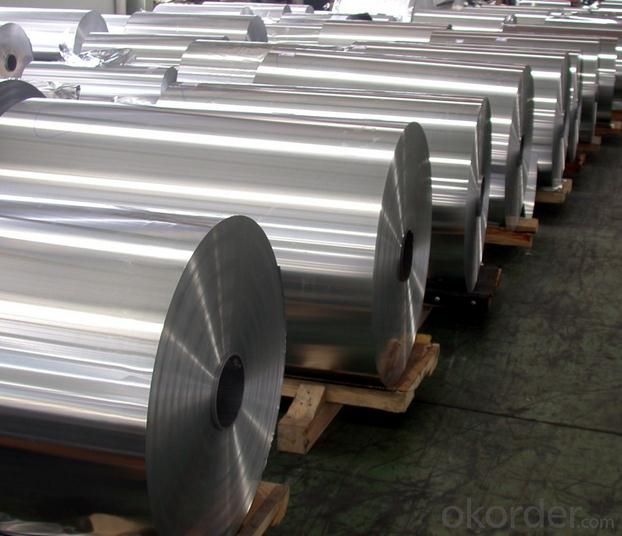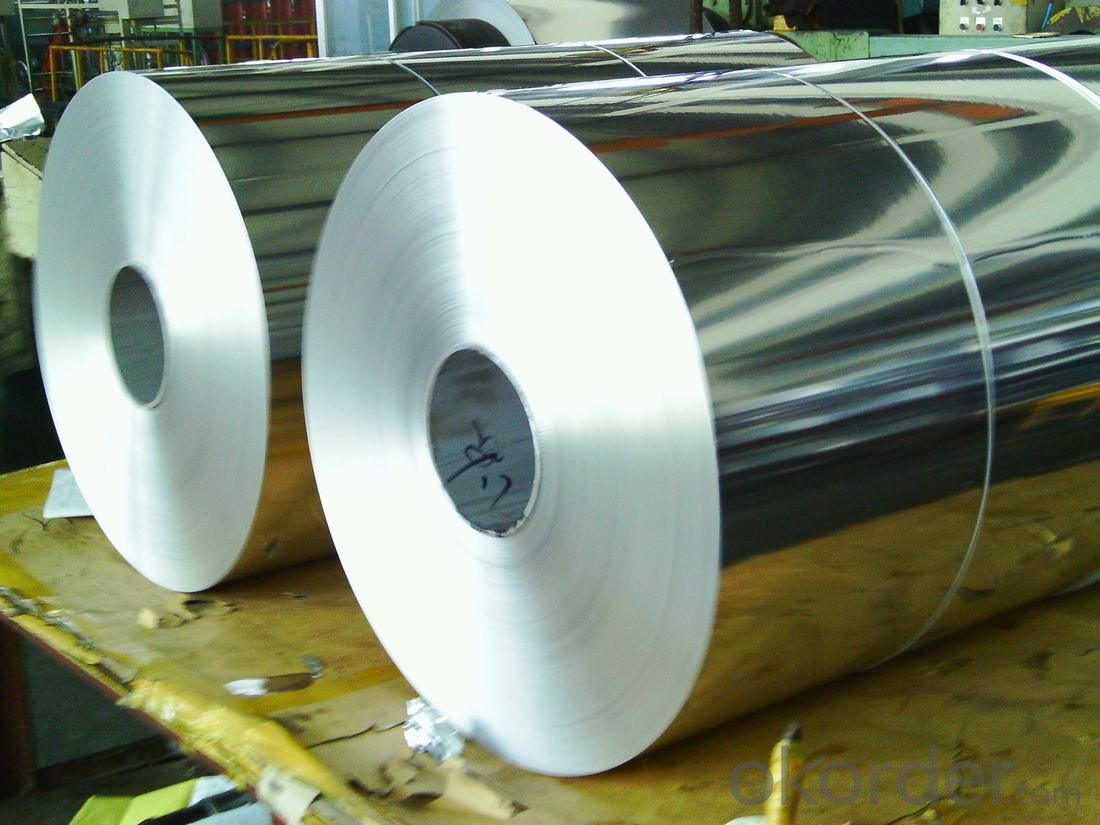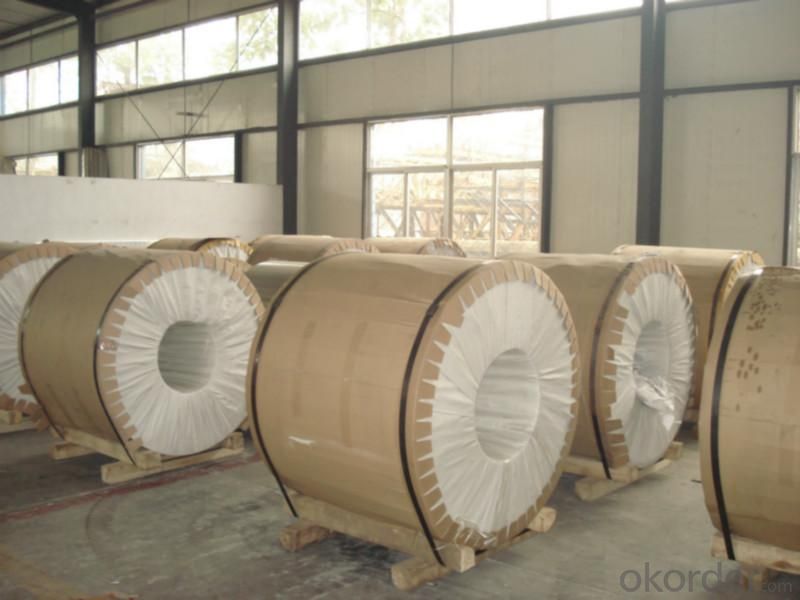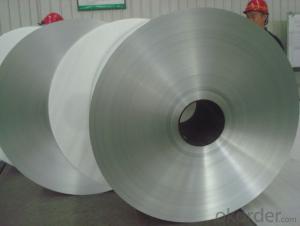ASTM Grade 6061 Aluminum Strips Belt For Solar
- Loading Port:
- Shanghai
- Payment Terms:
- TT OR LC
- Min Order Qty:
- 5 m.t.
- Supply Capability:
- 500 m.t./month
OKorder Service Pledge
OKorder Financial Service
You Might Also Like
Item specifice
ASTM Grade 6061 Aluminum Strips Belt For Solar
aluminum coil specifications:
1) Alloy :1050, 1060,1100, 3003 3004 3105 3A21 5005 5052 etc
2) Temper: O/H12/H14/H1/H18/H32/H34/H36/H38//H111/H112/H116/H321/T6/T651/T3/T351 etc
3) Thickness: 0.1mm to 6mm
4) Width:20mm to 3300mm
5)Coil weight: 100kgs to 6 tons depends on actual requirement
6)Core material: Aluminum or paper
7)Coil Inner diameter: 75mm, 150mm, 200mm, 300mm, 405mm, 505mm or as required
8) Protective film can be added
item | 3003 Aluminum coil | |
Standard | GB/T3190-2008,GB/T3880-2006,ASTM B209,JIS H4000-2006,etc | |
Material | 1060,1050,1100 3003,3103,3004,3005,3105 5052, 5454,5754 | |
Size | Thickness | 0.5mm-3.5mm |
Width | 800-1500mm | |
Weight/Roll | About 1.5MT/3MT | |
Quality control | Mill Test Certificate is supplied with shipment, Third Part Inspection is acceptable. | |
Surface | Bright, polished, hair line, brush, checkered, embossed, etc | |
Trade terms | Price term | ,FOB, CNF, CIF, etc |
Payment Term | TT,L/C | |
MOQ | 2MT | |
20 GP Capacity | About 20-25MT | |
Delivery time | 1.The products will delivery immediately after receiving the payment. 2.According to the order quantity, prompt delivery. | |
Export to | Ireland,Singapore,Indonesia,Ukraine,Spain,Canada,USA,Brazil,Thailand,Korea,Iran,India,Egypt,Kuwait, Oman,Viet Nam, South Africa, Dubai, Russia, etc | |
Package | Stick blue film→plastic film→waterproof paper→1~2 tons on a export standard pallet(corner protection) | |
Application | 1)Further making utensil.2)Solar reflective film3)The appearance of the building4)Interior decorating:ceilings,walls,etc.5)Furniture cabinets6)Elevator decoraction7)Signs,nameplate,bags making.8)Decoration inside and outside the car9)Household appliances:refrigerators,microwave ovens,audio equipment,etc.10)The consumer electronics:mobile phones,digital cameras,MP3,etc. | |



- Q:How do aluminum coils perform in cryogenic environments?
- Aluminum coils generally perform well in cryogenic environments due to their low thermal expansion coefficient and high thermal conductivity. When exposed to extremely low temperatures, aluminum coils exhibit minimal contraction and expansion, making them suitable for use in cryogenic applications. The low thermal expansion coefficient ensures that the coils maintain their structural integrity and do not deform or crack under extreme temperature fluctuations. Additionally, aluminum's high thermal conductivity allows for efficient heat transfer, enabling the coils to dissipate excess heat and maintain a stable temperature within the cryogenic environment. Overall, aluminum coils are a reliable choice for use in cryogenic environments and can effectively withstand the challenges posed by extremely low temperatures.
- Q:Are aluminum coils suitable for architectural cladding applications?
- Yes, aluminum coils are suitable for architectural cladding applications. Aluminum is lightweight, durable, and corrosion-resistant, making it an ideal material for cladding buildings. It can be easily formed into various shapes and sizes, allowing for creative and unique designs. Additionally, aluminum coils offer excellent weather resistance, low maintenance requirements, and a wide range of color options, making them a popular choice in architectural cladding projects.
- Q:Can aluminum coils be used in the production of aluminum doors?
- Yes, aluminum coils can be used in the production of aluminum doors. Aluminum coils are typically used as a raw material in the manufacturing process of aluminum doors. These coils are made from high-quality aluminum alloy and are available in various thicknesses and widths. They can be easily formed into different shapes and sizes to meet the specific requirements of the doors. Additionally, aluminum coils are lightweight, durable, and resistant to corrosion, making them an ideal choice for door production. The coils are often processed through various techniques such as cutting, bending, and welding to create the desired door components. Overall, aluminum coils offer many advantages in terms of versatility, strength, and aesthetics, making them a popular choice for aluminum door manufacturers.
- Q:what is the most likely charge for aluminum cation?the answer is +3, but why? how can i figure this out with different ones?
- Aluminum Cation
- Q:How are aluminum coils inspected for quality control?
- Aluminum coils are inspected for quality control through various methods including visual inspection, dimensional checks, and non-destructive testing techniques such as ultrasonic testing, eddy current testing, and X-ray inspection. These inspections help to ensure that the coils meet the required specifications, have no visible defects, and possess the desired mechanical properties before they are used in various applications.
- Q:How are aluminum coils processed to achieve desired mechanical properties?
- Various techniques are employed to process aluminum coils in order to attain the desired mechanical properties. One method commonly utilized is known as annealing, wherein the coils are heated to a specific temperature and then gradually cooled. This particular process aids in reducing internal stresses and enhancing the metal's ductility and toughness. Another significant procedure is cold rolling, whereby the coils are passed through a series of rollers at room temperature to decrease their thickness and improve their mechanical properties. Not only does this technique bolster the aluminum's strength, but it also enhances its surface finish. To further augment the mechanical properties, aluminum coils can also undergo alloying. This involves blending the aluminum with other elements such as copper, manganese, or magnesium to form specific alloys. These alloys provide superior strength, corrosion resistance, and other desirable properties. Furthermore, heat treatments like precipitation hardening can be applied to aluminum coils. This process necessitates heating the coils to a specific temperature and maintaining them at that level for a certain duration, followed by rapid cooling. Precipitation hardening enables the formation of fine particles in the metal's microstructure, thereby increasing its strength and hardness. Lastly, surface treatments like anodizing or painting can be employed on aluminum coils to enhance their mechanical properties. Anodizing creates a protective oxide layer on the surface, improving corrosion resistance, while painting offers additional protection and aesthetic appeal. In conclusion, aluminum coils are subjected to various techniques including annealing, cold rolling, alloying, heat treatments, and surface treatments to achieve the desired mechanical properties. These processes serve to enhance the aluminum's strength, ductility, toughness, and corrosion resistance, rendering it suitable for a wide array of applications.
- Q:Are aluminum coils suitable for architectural louvers?
- Indeed, architectural louvers can be constructed using aluminum coils as they possess remarkable corrosion resistance, a lightweight composition, and a commendable strength-to-weight ratio. The malleability and manipulability of aluminum coils grant them the ability to be effortlessly shaped and fabricated into diverse forms and dimensions, thereby rendering them exceptionally suitable for fashioning aesthetically appealing and practical louvers. Moreover, the robustness of aluminum guarantees that the louvers will endure severe weather conditions and retain their structural integrity for an extended period. In conclusion, aluminum coils serve as a dependable and adaptable material choice for architectural louvers.
- Q:Can aluminum coils be used in electrical cables?
- Electrical cables can indeed incorporate aluminum coils. Aluminum is widely utilized as a material for electrical conductors due to its exceptional electrical conductivity and comparatively lower cost when compared to copper. Its usage is particularly prominent in power transmission and distribution cables that necessitate long-distance transmission. Overhead power lines and underground cables often employ aluminum coils. However, it is crucial to acknowledge that aluminum possesses a lower tensile strength than copper, requiring careful design and manufacturing of the cables to ensure sufficient mechanical strength. Furthermore, achieving the same electrical performance with aluminum conductors necessitates larger cross-sectional areas compared to copper, potentially resulting in slightly larger cable sizes.
- Q:How are aluminum coils used in the production of window frames?
- Due to its numerous benefits, aluminum coils are widely utilized in the manufacturing of window frames. These coils are typically fabricated from top-notch aluminum alloy, offering qualities such as strength, durability, and resistance to corrosion. To initiate the window frame production process, the aluminum coils are initially unrolled and cut into the desired lengths. These coils come in various thicknesses, enabling manufacturers to produce window frames of different sizes and specifications. Subsequently, specialized machines are employed to shape the aluminum coils into the required profiles. These profiles can be extruded, bent, or rolled into diverse forms, such as rectangular or curved, depending on the window frame design. This flexibility in shaping permits the creation of customized window frames that fulfill specific architectural requirements. Once the profiles are shaped, they are joined together using various techniques such as welding or mechanical fasteners. The lightweight nature of aluminum facilitates easy handling during the assembly process, leading to reduced production time and costs. Furthermore, the aluminum coils can be treated with different surface finishes, such as anodizing or powder coating, to enhance their appearance and provide additional protection against weathering and wear. These finishes also offer a wide array of color options, allowing window frame manufacturers to match the frames with the overall building design or the homeowner's preferences. The utilization of aluminum coils in window frame production brings forth several advantages. Aluminum is an exceedingly sustainable material as it can be recycled multiple times without compromising its properties. Additionally, its lightweight characteristic simplifies the installation process and lessens the burden on the structure. Moreover, aluminum exhibits excellent thermal conductivity, which aids in enhancing energy efficiency by minimizing heat transfer. In conclusion, aluminum coils play a vital role in the production of window frames. Their strength, durability, flexibility, and aesthetic options make them the preferred choice for manufacturers. Whether for residential or commercial applications, aluminum coils provide high-quality window frames that adhere to industry standards and elevate the overall appearance and performance of buildings.
- Q:Can aluminum coils be used in chemical processing equipment?
- Yes, aluminum coils can be used in chemical processing equipment. Aluminum is known for its excellent corrosion resistance, making it suitable for use in many chemical environments. It is resistant to a wide range of acids, alkalis, and other corrosive substances. Additionally, aluminum coils are lightweight and have good heat transfer properties, making them ideal for applications where heat exchange is required. However, it is important to note that aluminum has limitations in certain aggressive chemical environments, such as strong acids like hydrochloric acid or sulfuric acid. In such cases, alternative materials like stainless steel or titanium may be more appropriate.
1. Manufacturer Overview |
|
|---|---|
| Location | |
| Year Established | |
| Annual Output Value | |
| Main Markets | |
| Company Certifications | |
2. Manufacturer Certificates |
|
|---|---|
| a) Certification Name | |
| Range | |
| Reference | |
| Validity Period | |
3. Manufacturer Capability |
|
|---|---|
| a)Trade Capacity | |
| Nearest Port | |
| Export Percentage | |
| No.of Employees in Trade Department | |
| Language Spoken: | |
| b)Factory Information | |
| Factory Size: | |
| No. of Production Lines | |
| Contract Manufacturing | |
| Product Price Range | |
Send your message to us
ASTM Grade 6061 Aluminum Strips Belt For Solar
- Loading Port:
- Shanghai
- Payment Terms:
- TT OR LC
- Min Order Qty:
- 5 m.t.
- Supply Capability:
- 500 m.t./month
OKorder Service Pledge
OKorder Financial Service
Similar products
New products
Hot products
Hot Searches
Related keywords




























